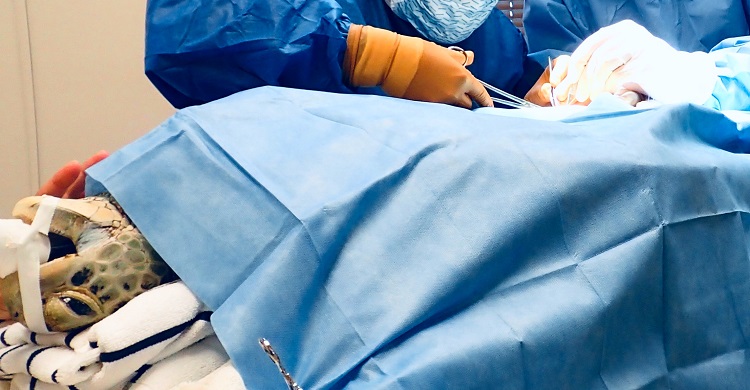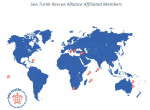The Sea Turtle Rescue Alliance – Developing Medical Capacity and Training for Sea Turtle Veterinarians and Centres Around the World

Surgery © Ashley Isaac
By Maximilian Polyak, DVM, MPhil, CertAqV & Claire Petros, BVSc, MRCVS
The health of threatened sea turtles is an important concern for maintaining the critical ecological roles that they play in marine ecosystems. Threats to sea turtle health that result in trauma, disease, and stranding, as well as the subsequent need for medical care, are increasing. Yet existing capacities to meet such challenges have been fragmented and difficult to implement on a broad scale. Hundreds of sea turtle rescue and rehabilitation facilities around the world have focused principally on disease surveillance, stranding and rehabilitation protocols, veterinary workshops, and provision of online resources that cater to veterinary surgeons.
However, until recently, there was no comprehensive, accessible platform that the many stakeholders in the sea turtle rehabilitation community can turn to when faced with treating an injured sea turtle. To fill this void, Sea Turtle Rescue Alliance (STRA), the world’s first NGO committed to expanding access to sea turtle medical care and training, and using modern telemedicine technology.
Shared medical networks are important tools in human and veterinary medicine alike. STRA facilitates collaboration and connectivity between veterinary professionals, enhances knowledge and capacities at rescue centres, and helps to ensure that standards and best practices are adhered to by sea turtle clinicians worldwide. STRA has partnered with the veterinary patient management software company, Provet Cloud, and with the Swiss-based ocean conservation non-profit OceanCare to develop an easy-to-use, globally accessible, cloud-based system for sea turtle clinical records. This platform offers its users tailored access to sea turtle veterinarians, technicians, field biologists, and conservation managers. STRA can even be used for virtual consultations about clinical cases and for clinical and diagnostic support. STRA also aspires to provide online training to rescue-centre professionals, to assist with refining and reporting clinical techniques.
Case consultations and daily telemedicine service occur weekly, and usage is rapidly accelerating. For example, a juvenile hawksbill turtle admitted to a rehabilitation centre in Kenya with significant head trauma from a suspected spearfishing event was successfully triaged and treated through daily consultations with STRA veterinarians. This turtle exhibited profound neurological deficits and required intensive medical care, but with help from STRA, the Kenyan team successfully released the patient to the wild.
In another case, STRA was able to assist efforts to triage and manage an adult female green turtle in The Gambia that had experienced severe trauma from machete strikes.
And recently a subadult green in the United Arab Emirates was diagnosed with gastrointestinal obstruction; using STRA’s telemedicine platform, veterinarians were able to virtually guide the facility staff through complex case management including whole blood transfusion, formulation and administration of intravenous nutrition, and even laparoscopic surgery. This patient is recovering well and is expected to be released.
Those examples provide a small glimpse of what STRA can offer to the more than 130 (and growing) sea turtle rescue and rehabilitation centres worldwide, where access to advanced care might not otherwise be available.
STRA offers exciting opportunities for global collaboration in the effort to protect threatened and endangered sea turtles. This year, STRA has grown to sixteen Affiliated Rescue Centres from Italy to Australia with individuals spanning 22 countries, truly a growing global community.
We have launched our Microsoft SharePoint site for members, which includes a growing database of sea turtle medical, health and management resources as well as rolled out our Provet cloud-based clinical management software in two centres for the second stage of its development. STRA continues to host bi-monthly Medical Series talks on our social media platforms from experts in the sea turtle healthcare field. STRA’s veterinarians will be holding a first-of-its-kind symposium in Thailand early next year, part-funded by a grant from the Joanna Toole Foundation, to provide hands-on training in sea turtle medicine and techniques to veterinarians in Asia.
And finally, STRA’s leadership team is actively cultivating new collaborations and requesting more members to join the steering committee by having regional directors that can help implement the network further afield. So if you’re interested in becoming involved or learn more, please visit https://seaturtlerescuealliance.org/
Last updated on 02 December 2022





